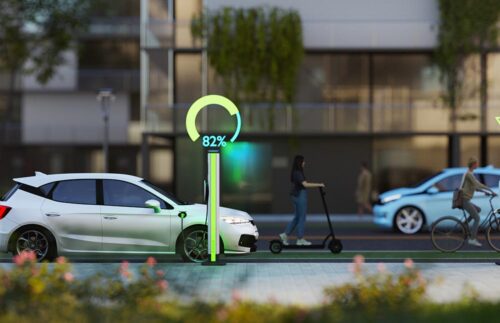Act Global, Think Sustainable
 Invest in Our Planet is April’s Earth Day theme. This annual celebration honors the achievements of the environmental movement and raises awareness of the need to protect Earth’s natural resources for future generations.
Invest in Our Planet is April’s Earth Day theme. This annual celebration honors the achievements of the environmental movement and raises awareness of the need to protect Earth’s natural resources for future generations.
The emergence of ESG strategies
Over the past few years, we have been investing heavily in our planet. Our language reflects it; phrases like going green, eco-friendly, and sustainability are commonplace. Companies worldwide are using concepts such as environmental, social, and governance (ESG) in their sustainability and supply chain strategies. It’s an accepted practice for companies to issue sustainability reports and identify near-term targets and long-term targets when referring to how their company will reduce emissions or achieve net zero over the next 5-10 years—or by the hard-fast date of 2050.
UK’s zero-emission vehicle mission
The U.K. has stepped up their mission to be at the forefront of the design and manufacturing of zero-emission vehicles by 2040. The strategy is for at least 50%, and as many as 70%, of new car sales and up to 40% of new van sales to be ultra-low emissions by 2030. And by 2050, the goal is to have almost every car and van to be zero emission.1
Accelerating toward net positive impact
These initiatives have companies moving from incremental improvements to bolder, faster deployment of systemic approaches that will create a net positive impact on the world, answer the call to end poverty, protect the planet, and ensure all people enjoy peace and prosperity.
Industries’ transformation for planetary boundaries and inclusive economy
Industries are challenged and on board with driving further business transformation to create value, manage risks, and reconfigure their business and entire systems to ensure we respect our planetary boundaries and create a more inclusive and resilient economy. Companies and industries worldwide are already working toward:
- Developing sustainable supply chains
- Reducing carbon emissions
- Using eco-friendly materials
- Moving toward a circular economy business model
- Improving antiquated processes via digital technologies
- Integrating cloud solutions into their business strategies
- Implementing and meeting net-zero sustainability targets
Companies making sustainable transitions
Here are a few companies working with Arena that are making great strides in improving their carbon footprint.
Driving the electrification revolution with innovative power solutions
Electric vehicles (EVs) are moving along at a blistering pace toward a cleaner economy by dominating the power of electricity and battery technology. FreeWire Technologies electrifies industries that were previously reliant on fossil fuels. They provide turnkey services from EVs to utilities by integrating modern design with convenient services. For dependable electrification outside of the grid, FreeWire’s complete power solutions offer electricity whenever and wherever it’s required.
With the White House’s unveiling of the nation’s first-ever national EV charging standards that come under the new National Electric Vehicle Infrastructure (NEVI) program, FreeWire is poised to play a major role in the Biden administration electrification plan. The company has already established relationships with gas station stakeholders such as Phillips 66, Chevron, and Texaco branded stations. FreeWire announced a new 66,000-square-foot global headquarters in Newark, CA, a $20 million investment that will focus on R&D and manufacturing of ultrafast EV charging equipment and more than 200 well-paying engineering and manufacturing jobs in electrification and clean energy across the community.2
Circular solutions for advanced metering infrastructure
Instagrid, a pioneer of off-grid portable battery systems that provide a sustainable alternative to high-pollution combustion generators, is working to lower emissions and other harmful effects with clean, portable power. The issue they are challenged with is—conventional small non-road engines are hardly regulated anywhere in the world, including the EU. Consequently, information on their impact on the environment and sustainability is scarce.
To solve this challenge, instagrid initiated an EU-wide project to investigate if portable battery systems could be a more sustainable alternative to combustion generators. The result: portable battery systems significantly outperform conventional combustion engines in terms of environmental, social, and financial benefits.
The company switched out standard combustion generators with their instagrid ONE max batteries on building sites and assessed the results for air quality, greenhouse gas emissions, and performance to confirm the advantages. As a result, instagrid has implemented sustainable product development principles and practical guidelines to further improve the environmental impact.
Achieving ISO standards and establishing science-based targets
Trilliant , a leading international provider of solutions for advanced metering infrastructure, smart grids, and smart cities, is taking the initiative to become more circular to reduce its carbon footprint and provide an elevated experience for its customers.
, a leading international provider of solutions for advanced metering infrastructure, smart grids, and smart cities, is taking the initiative to become more circular to reduce its carbon footprint and provide an elevated experience for its customers.
Thanks to its employees, the company has integrated sustainability into the core of its operational procedures and plans to further sustainability in several ways. Trilliant was recently recertified to be compliant with ISO 9001 and 14001 standards by a DEKRA audit. This certification ensures they are continuously using products and services that meet their customers’ high standards. It also ensures that Trilliant’s methods for environmental sustainability are applied across its entire value chain.
Trilliant was awarded a significant grant that will enable them to establish science-based targets for emissions reductions and rigorously evaluate their carbon footprint. With the assistance of sustainability experts, Trilliant is moving faster toward sustainability initiatives.
Advancing circular design and energy efficiency
Sonos, a world leader in sound equipment and the inventor of multiroom wireless home audio, delivers an unparalleled sonic experience. In their journey to create sustainable products that last longer, Sonos uses less energy and incorporates circular materials.
Their ERA products are designed for serviceability which enables them to last a long time and actively work to reduce the environmental footprint of their operations. As an example, their speakers use screws in place of adhesives making it easier to disassemble, repair, and recycle.
When it comes to energy efficiency, ERA speakers have been engineered to significantly reduce power consumption, lowering the company’s overall footprint. They’re the first all-in-one speakers to support a sleep function, which customers can expect to see supported on more products through future software updates.
Sonos also provides customers with a variety of options for recycling their retired products, including helping locate nearby e-waste facilities and paying for products to be shipped back to Sonos. Their updated packaging includes labels explaining exactly how to dispose of certain materials. As Sonos continues its sustainable journey, they are focused on addressing the total environmental impact of their products—from manufacturing and transport to use, and ultimately, end-of-life.
PLM solutions enhance sustainability in product development
These and other manufacturers are discovering the benefits of product lifecycle management (PLM) to support a circular strategy and develop more sustainable products. PLM solutions enable cross-functional team and supply chain collaboration to streamline the entire new product development and introduction (NPDI) process. Connecting teams and systems helps create efficiencies that result in more sustainable design decisions, reduce scrap and rework, and give visibility into how a product can be reused, recycled, redistributed, or remanufactured throughout the entire product lifecycle.
Sustainability is accelerating, let’s keep investing in our planet
Sustainability is now a household term—that wasn’t always so. The sustainability movement is accelerating and not a trend driven by the media. Big, overarching tendencies that drive change are actual, advancing, and inevitable. The price of inaction is increasing, especially in the fields of clean energy and transportation—the cost of action has decreased rapidly. Stakeholders are pressuring corporations to act, particularly young customers, and staff. Many businesses are increasingly seeing the advantages of stepping up their environmental initiatives by paving the road for a net-zero future.
Learn more about how Arena is contributing to sustainability.
Further Sustainable Reading:
How Cloud Technologies Help Manufacturers Drive Sustainable Product Development
PLM And Circular Economy: A Framework For Sustainable Product Development
Sources Cited:


